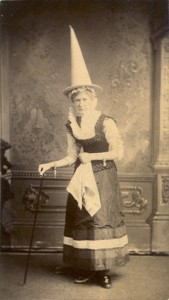We had a gift exchange at our Reclaiming ritual a few months ago. Several picnic blankets were arranged in a large circle in the middle of the meadow. Scattered upon them were scarves, altar cloths, tarot decks, magical tools and trinkets, as well as large index cards. On those people wrote their gifts of time. Some offered to cook a meal for the recipient of the card, others a reiki session, a tarot reading, a hair cut. When it came time for me to choose my gift, I picked a card that read “tea with a crone.”
When I got home I placed the card on my altar. My life was too busy to imagine sitting down with an old woman over a cup of tea. It took months before I finally called the number on the card and scheduled a date with MaryAnn*. When I finally arrive at her place, I wish I had called and met up with her sooner.

MaryAnn’s apartment is located in a busy part of town. She lives by herself, near a BART transit station, and leads a very social and active life. I don’t feel the ‘old folks’ vibe I expected in her home. Instead of old fashioned floral prints and china, open surfaces are covered with altar items and tasteful decorations. MaryAnn leads me into the kitchen to choose from her large tea collection. Then we settle into the living room, sip tea, and talk about life. I come away with a new friend, and the eight pieces of crone wisdom:
1. Processing takes a lifetime
“I’ve been working on this for 84 years,” MaryAnn says as we’re comparing stories about our upbringing. That’s when I finally ask her age. She’s 88. Dramatic things happened in her family when she was 4 and she is still processing them. How daunting, I think. Processing is forever! On the other hand, if 84 years aren’t enough time to resolve all childhood issues, I feel a sense of relief. Maybe it’s OK to be more gentle with myself for not having it all figured out in my thirties.
2. Pay attention to the ancestors
Don’t underestimate the impact our ancestors still have on our lives, MaryAnn says. Not only will you be processing your childhood for the rest of your life, you’ll also be dealing with inherited guilt and trauma. Growing up in the South in the 1920s, MaryAnn describes how she has seen the racism of one era passed down to the next generation. “Look into the story of your ancestors,” MaryAnn urges. “Find the guilt, find the trauma, and work on healing them in your generation.”
3. Celebrate how far we’ve come
Pay attention to the problems of our age, but don’t forget to celebrate how far we’ve come. MaryAnn continues to advocate for racial justice, for gender equality, queer and transgender rights. “But always remember how far we’ve already come,” she says. Pointing at the successes of the past can be used as an excuse to neglect the problems of the present. MaryAnn knows this. But to those of us who are working for justice, her message is clear: remember to celebrate! To illustrate, she tells stories from her youth in the 1930s and 1940s that make my skin crawl. And she’s right, as I hear the stories, as I look at where we are at today, I find renewed strength for the struggles of today and the struggles ahead.

4. Value your elders
MaryAnn tells me that 2001 was the last time she had had any elders. The last older family member and friend died fifteen years ago. When was the last time she was not the oldest person in a group? She can’t remember. The teachers she has today are all young enough to be her children or grandchildren. Does she miss learning from people who have more life experience than she does? Absolutely, she says. It makes me want to spend more time with my elders. Some day, they will be gone. Today is a good day to honor and appreciate them.
5. Make peace with your exes (if possible)
In a time when divorce was anathema, MaryAnn dared to walk her own path and separated from her husband. It’s never too late to start having your own life, she insists. The divorce was hard and there was little social support. Eventually, however, she and her ex-husband made peace with their mutual past. And who knows? Maybe that’s one of the keys to longevity. After all, MaryAnn and her former husband, who is now 91 years old, still see each other occasionally. Mostly at other people’s funerals.
6. Forgive yourself
As for the mistakes you’ve made, the ones that haunt you? Most won’t matter anymore by the time you’re in your eighties. MaryAnn smiles and shakes her head. “Seriously,” she says. “You think you need to beat yourself up over your failings? Life has enough beatings in store for you. You don’t need to do any of the beating yourself. Trust an old crone on that.” Point taken.
7. Never stop having adventures

Source: Wikipedia Commons
MaryAnn’s eyes glow when she asks me “so, did I tell you about the Ayahuasca retreat I’m going to?” I must have heard her wrong. “What do you mean, you’re going to take Ayahuasca?” I ask. “Of course! This will be my second retreat. I tried it for the first time last year.” In her 87th year of life, MaryAnn decided the entheogenic Ayahuasca plant was meant to be a part of her spiritual quest. She researched and found a shaman she trusted, and traveled to her first Ayahuasca retreat, by herself, with few previous drug experiences. I consider how often I think of adventures in terms of “what I should have tried in my youth.” MaryAnn’s stories challenge me. “It’s never too late to experiment and have adventures,” she laughs.
8. Focus on what really matters
My new friend has no intention of dying soon. She’s still in love with life and ready to experience more of it. But her focus has shifted. “Sift and sort through what’s really important in life,” she tells me. Make time for friends, make time for being present. Most of us, make time for your own spiritual journey. In the end, that’s all you’ll have left. And drink tea. Always make time for a good cup of tea.
* name changed. Although she probably wouldn’t mind me using her real name, MaryAnn is so cool she could easily become a crone celebrity. And then I would have too much competition for scheduling our next crone tea date.
















